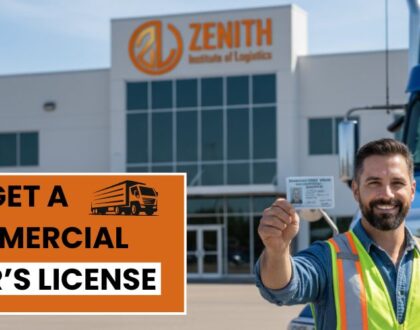How to Become a Professional CDL Truck Driver

Through their essential operation, the trucking industry transports goods effectively to businesses and customers in the economy. Vehicle operators beyond cargo movement contributions exist to ensure the functionality of supply networks, fulfill shipment timeframes and preserve highway security. This occupation delivers stability, decent payment, and career advancement pathways, which draws people who love living on the move.
Skills to operate a truck are necessary but insufficient for becoming a professional driver. To become an experienced trucker, you must complete CDL training, learn safety requirements, and practice controlled discipline during extended operational periods. Prospective truck drivers should know the following information about this career path.
The Importance of Truck Drivers

The economy depends heavily on truck drivers transporting products between all major locations, including cities, states, and international frontiers. A complete stoppage of supply chain operations becomes inevitable whenever truck drivers disappear, thus creating economic troubles for business operations and consumer access to products. Truckers maintain access to vital merchandise by transporting groceries and medical supplies through construction materials.
The transportation industry works efficiently because truck drivers ensure road safety and help the economy thrive. Driving students must complete extensive CDL training before they learn defensive techniques, cargo management requirements, and federal procedural understanding. They develop the skills to safeguard themselves and drivers everywhere on the highways through proper training.
How to Become a Truck Driver
Starting a career as a truck driver requires completing an established process that fulfills industry requirements and grants needed qualifications.
1. Meet the Basic Requirements
The first requirement for enrolling in CDL classes is to meet these three criteria.
- Interstate driving requires drivers to be at least twenty-one years old, and all drivers must reach eighteen for either type of driving.
- Have a valid driver’s license.
- Both background screening results and drug test outcomes must be positive.
- Have a clean driving record.
2. Enroll in a Truck Driver Training Program
The critical initial requirement involves finishing your truck driver training at an authorized institution. Students who enroll in CDL classes at Zenith Institute of Logistics learn vital skills concerning operating commercial vehicles, safety practices, and road rules. The complete training program must combine classroom teachings with driving experience.
3. Obtain a CDL
Owning legal rights to drive commercial trucks demands completing CDL training and obtaining your Commercial Driver’s License (CDL). This involves:
- A written knowledge test
- A skills test (road test, pre-trip inspection, and basic controls)
- Medical and vision exams
After completing the necessary tests successfully, you will obtain your CDL, which opens up the possibility of finding truck driving work.
4. Gain Experience and Specialize
The majority of novice drivers begin by accepting fundamental roles in trucking, which enables them to develop specialized skills in HAZMAT cargo handling, long-distance transportation, and temperature-controlled logistics processes. Acquired driving experience enables professionals to develop their abilities, which creates better career possibilities.
Tips for Pursuing a Career as a Truck Driver

A professional truck driver must demonstrate devoted commitment while accepting every responsibility. Here, you will find essential directions to help you succeed:
1. Choose the Right CDL Training Program
Professional truck driver training success requires students to select their educational institution carefully. Students should consider Zenith Institute of Logistics because it teaches practical skills, issues accepted certifications, and creates employment opportunities for its graduates.
2. Develop Strong Time Management Skills
Transportation professionals operate with fixed deadlines they must fulfill during their working hours. Understanding methods to organize routes alongside handling rest periods and handling unforeseen challenges will increase your effectiveness as a driver.
3. Prioritize Safety
Professional truck drivers’ security is their most important responsibility. Drivers must adhere to all road laws, check vehicles before trips, and practice defensive driving methods between inspections.
4. Stay Healthy on the Road
Drivers must expect physical challenges when their shift extends to many hours of driving. Your concentration and focus for driving will benefit from a healthy diet combined with exercise and sufficient sleep.
5. Keep Learning and Growing
Professional trucking operates under continuous changes that combine new industry advancements and legislative requirements. The industry requires updates about trends and specialized training through advanced courses that could lead to endorsements for different driving roles.
Also Read: How to Navigate the Commercial Driver License (CDL) Process
Conclusion
The trucking industry provides trucking professionals with the benefits of steady employment, attractive financial rewards, and advancement possibilities. Successful careers in the trucking industry await those who obtain CDL training and dedication. The top CDL classes and truck driver training programs at Zenith Institute of Logistics await anyone ready to progress toward their objectives. Zenith Institute of Logistics invites you to join its current student body and pursue an exciting career in trucking.
Recommended Posts

Automatic vs Manual Trucks: Which Should CDL Students Learn?
January 6, 2026



